Up Front
Georgia Southern to Host Summer Program for High Schoolers
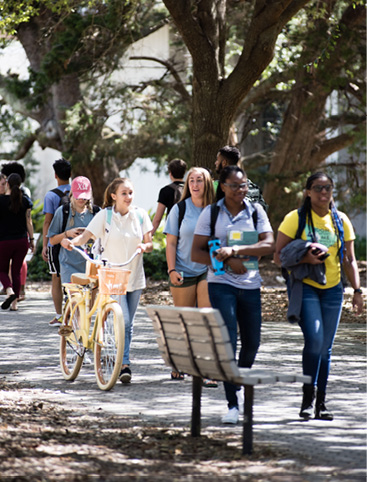
Georgia Southern University will welcome hundreds of high school students to the Statesboro Campus this summer. The state’s best and brightest rising high school juniors and seniors will take part in the Georgia Governor’s Honors Program. The prestigious four-week, residential summer program is designed to provide students with academic, cultural and social enrichment experiences necessary to help them become the next generation of global critical thinkers, innovators and leaders.
Students will live in Georgia Southern residence halls, eat in the dining facilities and learn in college classrooms, labs, studios and performance venues. The Governor’s Honors Program covers all tuition, fees and boarding costs. The only required and expected costs to the students are travel expenses, a few basic supplies for classes and rooms, and spending money.
“We are thrilled for the opportunity to host the Governor’s Honors Program at Georgia Southern,” said Georgia Southern University President Kyle Marrero. “Having these students on our campus will allow us to showcase our spectacular facilities and academic programs. We look forward to welcoming these students and their families.”
Student Project Showcases the Versatility of Bamboo
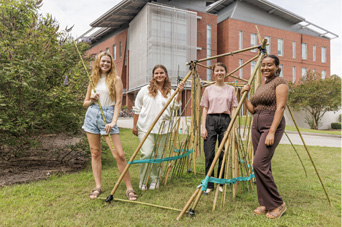
The School of Human Ecology at the College of Behavioral and Social Sciences is providing students with hands-on opportunities to develop their knowledge and skills for future careers. A recent project tasked students in the interior design program with exploring the environmentally friendly attributes of bamboo, one of the world’s most sustainable resources.
Under the guidance of faculty member Erin Holub and Assistant Professor of Interior Design Christine Wacta, Ph.D., students in the program were able to create a collaborative project from conception to completion, including a visit to a local bamboo farm to harvest material for their installation.
The students used a variety of software, including animation, video editing, CAD modeling, and graphic design, to plan, design and present their project. The result was a built installation outside the Interdisciplinary Academic Building on the Statesboro Campus that was in harmony with nature and human experience.
“This project supplied the students with a unique opportunity to design a project from beginning to end,” said Holub. “They developed a concept connected to the movement of the human body and the societal goals of their community.”
“This project supplied the students with a unique opportunity to design a project from beginning to end,” said Holub. “They developed a concept connected to the movement of the human body and the societal goals of their community.”
Georgia Southern’s Spar Program Goes National with $5.7 Million in Federal Funding
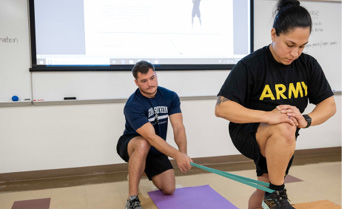
What began in 2016 as a partnership between Georgia Southern University and the 3rd Infantry Division at Fort Stewart has become a nationally recognized educational and research program with $5.68 million in federal funding to improve soldier health and performance to ensure force readiness.
The Soldier Performance and Readiness (SPAR) program aligns with the U.S. Army’s Holistic Health and Fitness (H2F) initiative, and seeks to decrease musculoskeletal injuries among soldiers, provide college credit-bearing online certificate programs in tactical fitness, and develop programs to enhance and assess cognitive performance in tactical situations. The program is being implemented in a train-the-trainer model, and its early success led to its expansion to other training brigades across the country.
The online Tactical Athlete Certificate program, available exclusively to soldiers on active duty, in the National Guard or reserve, is the centerpiece of the SPAR program. It teaches soldiers the fundamentals of exercise and biomechanical concepts, strength and conditioning principles, and rehabilitation through a series of courses. The program parallels the Army’s Master Fitness Trainer curriculum, with additional rehabilitation principles, and provides soldiers with nine college credits from Georgia Southern University upon completion.
The continued success of the SPAR program would not have been possible without the support of the Georgia Congressional Delegation and U.S. Rep. Buddy Carter, who represents Fort Stewart and the Armstrong Campus of Georgia Southern in Savannah. With the recent funding, the SPAR program is poised to make a real-world impact and improve the physical and combat readiness of soldiers across the nation.
Gretsch Family Visits Statesboro
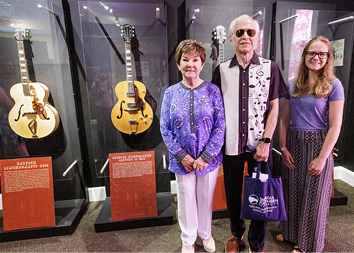
In August, the Fred and Dinah Gretsch and family got a behind-the-scenes tour of how their partnership with Georgia Southern has impacted both the local community and the student body after their generous naming gift was announced in early 2021.
“Since the announcement and naming of the Fred and Dinah Gretsch School of Music, we have seen a measurable impact in the elevation of the reach, reputation and capabilities of our music program and the University,” said Georgia Southern President Dr. Kyle Marrero. “We are grateful for this partnership and excited about our future plans and opportunities to come.”
While visiting, the Gretschs saw how their support paved the way for Georgia Southern to offer new courses and degrees, such as the Bachelor of Arts in Music with a concentration in music industry. They also donated Gretsch instruments for classrooms.
One highlight of the Gretschs’ visit was an exhibition of artifacts from their personal collection of Gretsch artifacts and memorabilia displayed at the Statesboro Convention and Visitors Bureau. Graduate students in the Graduate Seminar in Public History curated and built the exhibit, “Manufacturing Music: 140 Years of Gretsch Legacy.” The exhibit will be displayed through April.
The graduate students were led by Aaron Phillips, Georgia Southern’s project curator for the Fred and Dinah Gretsch Artifacts Collection and Brent Tharp, Ph.D., director of the Georgia Southern University Museum.
The Gretsch family also toured the University Records Center to see where the musical artifacts and corporate and family documents are being preserved for use by scholars and researchers from around the world. University Libraries and Museum faculty and staff are working together to catalog, preserve and make accessible these unique and important materials.
“It was wonderful to see firsthand work completed and in process by multiple departments within the University in furtherance of the Gretsch family goal to enrich lives through participation in music,” remarked Fred Gretsch.
Gretsch family members in attendance included Fred and Dinah Gretsch of the 4th generation and Logan Thomas, a 6th generation family member who served as the family photographer for the day.
See a video of producing “Manufacturing Music: 140 Years of Gretsch Legacy” here.
How Do You Like Them Apples?
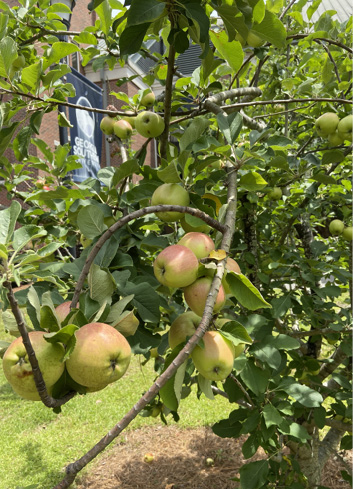
The Arboretum on the Armstrong Campus in Savannah is filled with a variety of plants, flowers, shrubs and trees. Did you know five varieties of apples are grown on the 268-acre campus? Anna, Dorsett Golden, Joy’s Apple, Big River and Tropic Sweet are all low-chill requirement varieties, making them an excellent choice for our region — and a delicious choice for the campus community.
The trees flower in January and produce fruit that is fully ripe and ready to pick in May. The trees are located in an orchard between the Science Center and Jenkins Hall, and because they aren’t treated with pesticides, they can be eaten straight from the tree.
Leave some for others, though. Everyone should have a chance to find the apple of their eye.
Georgia Southern Debuts Driverless Lawn Mower

Georgia Southern University has purchased a lawn mower that can be operated by remote control and does not require an onboard driver. The University was looking for ways to streamline its groundskeeping and become more efficient according to Adrianne McCollar, director of the Division of Facility Services.
“In the past few years, the University has acquired more acreage — the East Georgia building on 301 and the south campus expansion,” McCollar explained. “These acquisitions made us examine our operation and sent us on a quest to be more efficient and innovative. We realized that if we automate some of our functions, we could take care of more space with the team members that we already had.”
She emphasized that the robotic mower is not replacing employees.
“We pride ourselves on our beautiful campus,” McCollar told the Statesboro Herald. “We want our team members to be able to focus their skills on the landscape details that the community really appreciates and enjoys.”
The mower is powered by gasoline and runs like regular stand-up mowers except for the autonomous option. Although the mower works autonomously, an operator must be within range of the mower, which can be operated by remote control. The five onboard cameras can sense whether an object is in the way or someone enters the mower’s path according to McCollar. The University is testing it in large open areas such as recreation fields. The autonomous mower is manufactured in Maryland and was purchased from McKeithen’s True Value Hardware store in Statesboro.
Big Receives $1.2M and Georgia Southern Named Innovation and Economic Prosperity University

The Business Innovation Group (BIG) received news in November they are one of 51 nationwide grant recipients to receive $600,000 in grant funding along with $600,000 in local matching funds through the Federal ‘Build to Scale’ grant. The goal is to accelerate technology entrepreneurship by increasing inclusive access to entrepreneurial support and startup capital through a public-private partnership.
“Securing funding from the Build to Scale Program is a testament that our effort and approach is resonating with funding agencies and that our region is well-positioned to compete on a national scale,” said Georgia Southern Associate Provost for Innovation and Founder and Director of the Business Innovation Group Dominique Halaby, DPA.
Such accomplishments are part of the reason that Georgia Southern is now one of 80 higher education institutions designated by the Association of Public and Land-grant Universities (APLU) as an Innovation and Economic Prosperity (IEP) University. The national designation acknowledges public research universities working with public and private sector partners in their states and regions to support economic development through a variety of activities, including innovation and entrepreneurship, technology transfer, talent and workforce development and community development.
“Earning the IEP Designation is not only about recognizing Georgia Southern’s efforts in cultivating talent, driving innovation and fostering a sense of place in the communities we serve,” said Halaby. “It’s also about strengthening our long-term strategy to maximize our region’s economic potential.”
BIG is the business outreach arm for Georgia Southern located in downtown Statesboro, Georgia. The group provides resources for students and entrepreneurs to gain skills and training necessary to understand business principles, experience how businesses operate and successfully launch new enterprises. In addition to Statesboro, BIG has a center in Metter, Georgia, and one in development in Hinesville, Georgia. Over the past decade, BIG has assisted more than 3,000 entrepreneurs in creating 380 new businesses in local communities.
An ‘Awarding’ Trip!
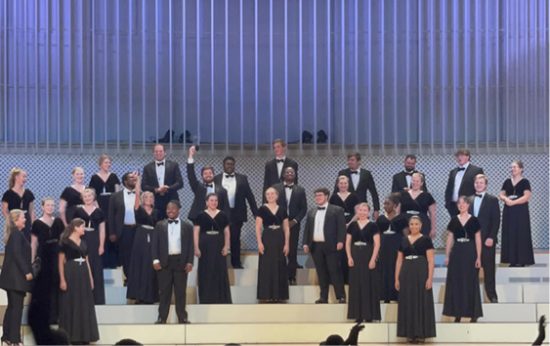
The elite 30-voice Georgia Southern Chorale from Georgia Southern University’s Fred and Dinah Gretsch School of Music earned top spots in the “Sing Berlin” international choral competition last summer in Germany. The group placed first in the “Sacra” and “Mixed Choir” categories and spent two weeks in Germany, exploring the country while performing and competing.
This was not a new experience for the Chorale. The group has competed and won in several global competitions. They competed in the International Anton Bruckner Choir Competition in Linz, Austria, in 2013 and won the Grand Prix at Laurea Mundi Budapest in 2016. They also won a Gold Certificate at the Ave Verum – Baden International Choral Competition in 2019, prior to a two-year layoff from international competitions due to COVID.
“I always look forward to putting the students’ talents and hard work on the international stage for Georgia Southern,” said Shannon Jeffreys, D.M.A., director of Choral Activities. “With the international choral competitions, our students get a better world view and see art and architecture from all over the world.”
Unlike previous years, students didn’t have to ask themselves if they could afford such an experience. Thanks to a grant from the Halle Foundation and financial support from the Georgia Southern Student Government Associations, all members of the Chorale traveled at no cost.
“It was really life-changing,” said Jackson Murray, who graduated this past December and also competed with the Southern Chorale in Austria his freshman year. “Since money was not a problem, I don’t know if there was another word to describe it. I’m forever grateful for the Foundation and for our student government association.”
“I’m so proud of the Georgia Southern Chorale,” said John Kraft, Ph.D., interim dean for the College of Arts and Humanities. “Their performance in Germany was world class. They truly deserve
their accolades.”
“It’s one of those feelings of pride that our university was able to do something like this for our students, said Murray.”
